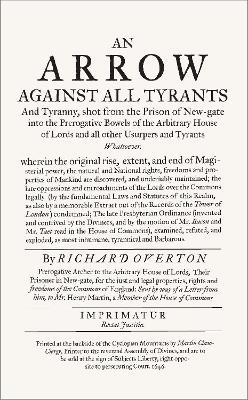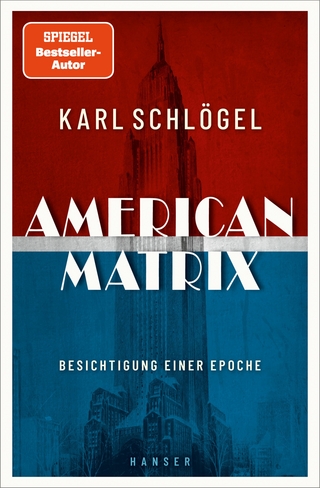
An Arrow Against All Tyrants
Canbury Press (Verlag)
978-1-912454-57-0 (ISBN)
In 1646 in Newgate Gaol in London, a political activist, Richard Overton, penned a pamphlet that contained dangerous ideas. An Arrow Against All Tyrants asserted the inalienable rights of the individual.
'No man has power over my rights and liberties, and I over no man's... For by natural birth all men are equally and alike born to like propriety, liberty and freedom.'
The thoughts contained within were radical at a time of historic upheaval in England.
This book reprints Overton's bold, declamatory pamphlet, carefully typeset from the original at the British Library.
It is introduced by Ian Gadd, Professor of English Literature at Bath Spa University, who sets Overton's work into its literary and historical context.
An Arrow Against All Tyrants is deal for anyone interested in the tumult of radical ideas during the English civil wars and the both of human rights.
Introduction by Ian Gadd (excerpt)
In October 1646, somewhere on the streets of London, the bookseller George Thomason picked up a scruffily printed work entitled An Arrow Against all Tyrants and Tyranny by Richard Overton (fl. 1640-63) and, as was his habit, noted the date of his latest acquisition on its title-page. Thomason had been systematically collecting all sorts of printed items since 1640 and An Arrow was just the latest example of what he and his contemporaries would have called a pamphlet – a word that, of course, still has currency today but that lacks much of the potency and meaning that it had for Overton's first readers.
First of all, a pamphlet was not a book. This may seem a curious thing to say, especially as you're currently holding this book in your hands, but a 17th Century reader would have understood the distinction. For a start, a pamphlet was not bound. Many printed works in England in this period were sold unbound – as folded, printed sheets ó in the expectation that a purchaser would get them bound, but some kinds of printed items, including pamphlets, were never intended for binding. Instead, a pamphlet like An Arrowwould have been 'stab stitched': simply held together by coarse thread that had been stabbed through the left-hand margin when the pamphlet was closed. In contrast to the careful, precise, and hidden sewing of a book binding, stab-stitching signalled a pamphlet's sense of urgency and directness – and also its likely ephemerality.
More in book
Richard Overton (fl. 1640–1664) was an English pamphleteer and Leveller during the Civil War and Interregnum (England). He wrote An Arrow Against All Tyrants while incarcerated in Newgate Gaol. Ian Gadd is Professor in English Literature at Bath Spa University, where he is academic director of the Global Academy of Liberal Arts. He is a member of the board of directors of the Bath Royal Literary & Scientific Institution and an external member of the curators of the University Libraries at the Bodeleian Libraries at the University of Oxford. He specialises in the literature and history of the 16th, 17th and early 18th Centuries.
INTRODUCTION. Ian Gadd, Professor of English Literature at Bath Spa University, introduces An Arrow Against All Tyrants by Richard Overton, which calls for universal human rights, written by an imprisoned radical in 1640s London. Parliament and the Stationers’ Company tried to ban such pamphlets.
FURTHER READING. Professor Ian Gadd suggests further reading: The Secret Printing and Publishing Career of Richard Overton the Leveller, 1644–46 by David R. Adams; The Oxford History of Popular Print Culture: Cheap Print in Britain and Ireland to 1660 edited by Joad Raymond (2011)
A PAMPHLET IN FOUR PARTS. Explaining that the work comprises four parts: 1. A letter from Richard Overton to radical MP Henry Marten; 2. A petition to the House of Lords protesting Overton's arrest; 3. A House of Lords report of the arrest; 4. A postscript, again from Overton to Henry Marten
FRONTISPIECE. Summary of the book by Richard Overton: 'An arrow against all tyrants and tyranny, shot from the prison of Newgate into the prerogative bowels of the arbitrary House of Lords, and all other usurpers and tyrants whatsoever'
LETTER FROM RICHARD OVERTON TO HENRY MARTEN MP. 'Prerogative archer to the arbitrary House of Lords, their prisoner in Newgate, for the just and legal properties, rights and freedoms of the Commons of England. Sent by way of a letter from him, to Mr Henry Marten, a member of the House of Commons'
PETITION BY RICHARD OVERTON TO HOUSE OF COMMONS. Richard Overton argues his arrest was 'illegal, and contrary to the natural rights, freedoms and properties of the free commoners of England (confirmed to them by Magna Carta, the Petition of Right and the Act for the abolishment of the Star Chamber'
HOUSE OF LORDS REPORT OF RICHARD OVERTON'S ARREST. 'It is this day ordered by the Lords in Parliament assembled, that Overton, brought before a committee of this House for printing scandalous things against this House, is hereby committed to the prison of Newgate for his high contempt...'
POSTSCRIPT: LETTER TO HENRY MARTEN MP. 'Let not the greatest peers in the land be more respected with you than so many old bellows-menders, broom-men, cobblers, tinkers, or chimney sweepers, who are all equally freeborn...'
NOTE ON THIS EDITION. This edition was specially conceived and printed to accompany the publication of How To Be A Liberal by Ian Dunt. It reproduces the text of Richard Overton’s An Arrow Against All Tyrants in its entirety from a copy at the British Library (shelfmark E.356[14])...
| Erscheinungsdatum | 05.03.2022 |
|---|---|
| Einführung | Ian Gadd |
| Zusatzinfo | 1 Illustrations, color |
| Sprache | englisch |
| Maße | 111 x 178 mm |
| Gewicht | 62 g |
| Themenwelt | Geisteswissenschaften ► Geschichte ► Regional- / Ländergeschichte |
| Geisteswissenschaften ► Philosophie | |
| Sozialwissenschaften ► Politik / Verwaltung | |
| ISBN-10 | 1-912454-57-2 / 1912454572 |
| ISBN-13 | 978-1-912454-57-0 / 9781912454570 |
| Zustand | Neuware |
| Haben Sie eine Frage zum Produkt? |
aus dem Bereich


